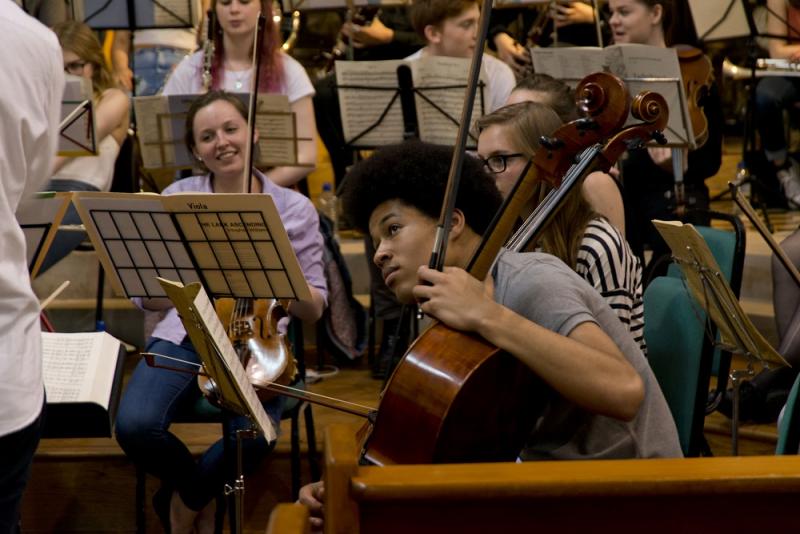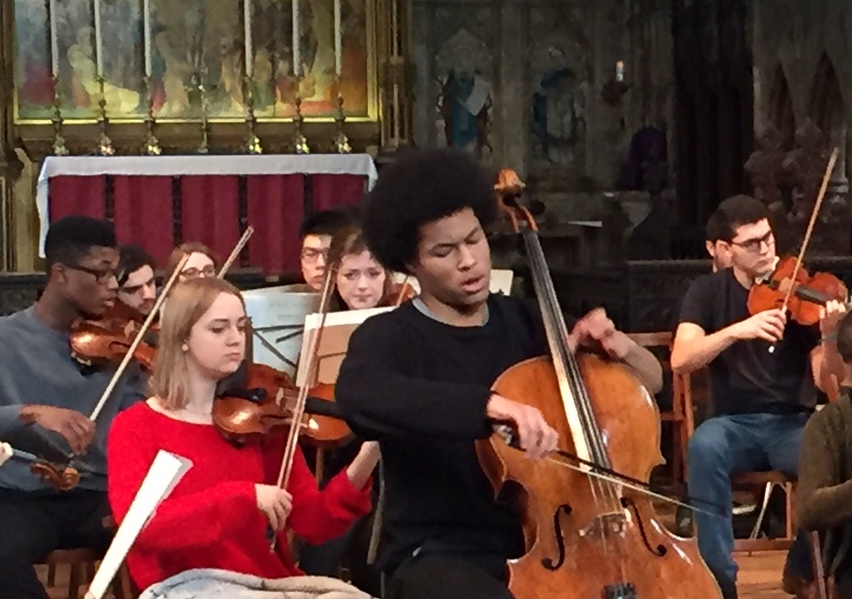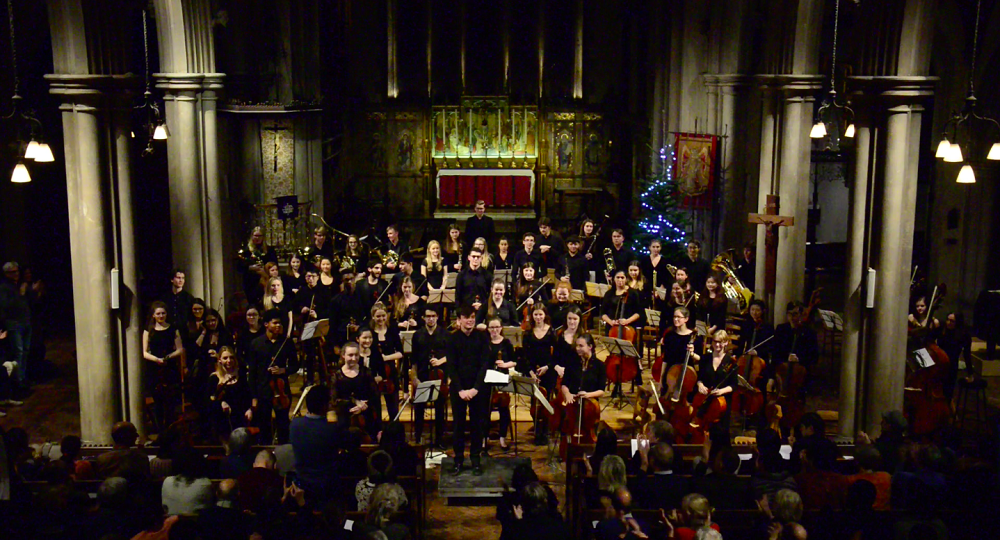Kanneh-Mason, Fantasia Orchestra, Fetherstonhaugh, St Gabriel's Pimlico | reviews, news & interviews
Kanneh-Mason, Fantasia Orchestra, Fetherstonhaugh, St Gabriel's Pimlico
Kanneh-Mason, Fantasia Orchestra, Fetherstonhaugh, St Gabriel's Pimlico
BBC Young Musician of the Year isn't the only major junior talent on show here

Sheku Kanneh-Mason isn't just BBC Young Musician 2016 - he's the year's top player in my books, a master at any level. Despite a contract with Decca, starting with the Shostakovich First Cello Concerto he played in the competition finale, he looks likely to remain loyal to family and friends, including the Fantasia Orchestra, founded this year, in which he's already played as part of the cello section.
You have to pinch yourself to realise the ages delivering this quality. Kanneh-Mason is 17, as was Mendelssohn when he composed the work of total genius which launched last night's concert; conductor Tom Fetherstonhaugh, currently Junior Organ Scholar at Merton College, Oxford, is 18; many of the players in the Fantasia are younger still, coming as they do from junior as well as senior conservatoire orchestras (another Kanneh-Mason, brother Braimah with whom Sheku spars so charmingly in the fabulous BBC documentary, is one of the first violins). Kanneh-Mason was, of course, in the limelight, and the original reason for heading out to a high church in Pimlico, but this concert delivered so much more.

The technical difficulty of the work can be disproportionate to its effect, but Kanneh-Mason's intonation was near-perfect, his dynamic shading kept us focused and he even managed to make the minor-key mood at the heart of the Adagio sound profound. So much of his artistry is akin to the lessons of bel canto; there were parallels with Lucy Crowe's feather-light coloratura the previous evening in the virtuoso runs, and he even emulated the singer's messa di voce, swelling a phrase to a peak and gracefully retreating, in some of the most fiendish writing.
This is an instinctive artist who seems fully-fledged already, like Bryn Terfel or Angela Gheorghiu at the start of their careers - but Kanneh-Mason is even younger. And he now has on permanent loan from Florian Leonhard Fine Violins the 1610 Amati which contributed to his success in the BBC final to gild his subtleties. Fetherstonhaugh, in a personable, confident speech, had apologised for the lack of Christmas theming in the programme, managing to justify the Mendelssohn by mentioning its use in seasonal ballets by Ashton and Balanchine. No need: we can all dream of summer nights in the dead of winter, and then up popped Holst's tune for "In the Bleak Midwinter" as theme for a nimble set of variations in Kanneh-Mason's encore, his own work (like the impressive first-movement cadenza in the Haydn). Besides, there was also the panache of the Waltz of the Flowers from Tchaikovsky's The Nutcracker as the grand, unprogrammed finale (pictured below: Fetherstonhaugh and the orchestra at the end of the concert).

Even so, you don't get grander or more Tchaikovskyan than the great perorations of Sibelius's Second Symphony. Listening to the big tune or the rolling tide of lower strings in its dark counterpart, it was hard to believe you weren't listening to the best. Take the violins in the first statement of Sibelius's big Tchaikovsky melody, or the brilliant, silver trumpet of Alex Ridout, heroic throughout, capping the brass response (earlier, there was terrific presence from Johnny Mayers' tuba in Mendelssohn's forest, and the oboes had a very Sibelian bite in the scherzo).
The asymmetries of the radical opening Allegretto seemed to pose no difficulties for Fetherstonhaugh. Of course it's always fascinating to see where the pressure-points of this amazing work lie for a junior ensemble: clearly at the heart of the stalking slow movement and in the big build to the finale. But other difficulties which I've heard conductors bungle on disc and in concert, like the mad rushing just before the Tempo Andante comes to rest and the brief surfacings of the first movement's oscillating main idea as it flashes into being, were beautifully handled.
Fetherstonhaugh's style is low-key - no flapping around - and in firm control; in time he'll learn to loosen up in the shoulders and paradoxically acquire more of the right tension, too, but I've not been called upon to judge an 18-year-old conductor before. Clearly he's a splendid trainer; that violin section is already a thing of wonder. And yes, we got all the right goosebumps in the Sibelius finale and the Tchaikovsky waltz - not always guaranteed even by the best.
rating
Share this article
The future of Arts Journalism
You can stop theartsdesk.com closing!
We urgently need financing to survive. Our fundraising drive has thus far raised £49,000 but we need to reach £100,000 or we will be forced to close. Please contribute here: https://gofund.me/c3f6033d
And if you can forward this information to anyone who might assist, we’d be grateful.

Subscribe to theartsdesk.com
Thank you for continuing to read our work on theartsdesk.com. For unlimited access to every article in its entirety, including our archive of more than 15,000 pieces, we're asking for £5 per month or £40 per year. We feel it's a very good deal, and hope you do too.
To take a subscription now simply click here.
And if you're looking for that extra gift for a friend or family member, why not treat them to a theartsdesk.com gift subscription?
more Classical music
 Weilerstein, NYO2, Payare / Dueñas, Malofeev, Edinburgh International Festival 2025 review - youthful energy and emotional intensity
Big-boned Prokofiev and Shostakovich, cacophonous López, plus intense violin/piano duo
Weilerstein, NYO2, Payare / Dueñas, Malofeev, Edinburgh International Festival 2025 review - youthful energy and emotional intensity
Big-boned Prokofiev and Shostakovich, cacophonous López, plus intense violin/piano duo
 theartsdesk at the Three Choirs Festival - Passion in the Cathedral
Cantatas new and old, slate quarries to Calvary
theartsdesk at the Three Choirs Festival - Passion in the Cathedral
Cantatas new and old, slate quarries to Calvary
 BBC Proms: Estonian Philharmonic Chamber Choir, Kaljuste review - Arvo Pärt 90th birthday tribute
Stillness and contemplation characterise this well sung late-nighter
BBC Proms: Estonian Philharmonic Chamber Choir, Kaljuste review - Arvo Pärt 90th birthday tribute
Stillness and contemplation characterise this well sung late-nighter
 BBC Proms: Kholodenko, BBCNOW, Otaka review - exhilarating Lutosławski, underwhelming Rachmaninov
Polish composers to the fore in veteran conductor’s farewell
BBC Proms: Kholodenko, BBCNOW, Otaka review - exhilarating Lutosławski, underwhelming Rachmaninov
Polish composers to the fore in veteran conductor’s farewell
 theartsdesk at the Pärnu Music Festival 2025 - Arvo Pärt at 90 flanked by lightness and warmth
Paavo Järvi’s Estonian Festival Orchestra still casts its familiar spell
theartsdesk at the Pärnu Music Festival 2025 - Arvo Pärt at 90 flanked by lightness and warmth
Paavo Järvi’s Estonian Festival Orchestra still casts its familiar spell
 BBC Proms: Batsashvili, BBC Scottish Symphony Orchestra, Ryan Wigglesworth review - grief and glory
Subdued Mozart yields to blazing Bruckner
BBC Proms: Batsashvili, BBC Scottish Symphony Orchestra, Ryan Wigglesworth review - grief and glory
Subdued Mozart yields to blazing Bruckner
 Classical CDs: Hens, Hamburg and handmaids
An unsung French conductor boxed up, plus Argentinian string quartets and baroque keyboard music
Classical CDs: Hens, Hamburg and handmaids
An unsung French conductor boxed up, plus Argentinian string quartets and baroque keyboard music
 BBC Proms: McCarthy, Bournemouth SO, Wigglesworth review - spring-heeled variety
A Ravel concerto and a Walton symphony with depth but huge entertainment value
BBC Proms: McCarthy, Bournemouth SO, Wigglesworth review - spring-heeled variety
A Ravel concerto and a Walton symphony with depth but huge entertainment value
 BBC Proms: First Night, Batiashvili, BBCSO, Oramo review - glorious Vaughan Williams
Spirited festival opener is crowned with little-heard choral epic
BBC Proms: First Night, Batiashvili, BBCSO, Oramo review - glorious Vaughan Williams
Spirited festival opener is crowned with little-heard choral epic
 Interview: Quinteto Astor Piazzolla on playing in London and why Mick Jagger's a fan
Music Director Julián Vat and pianist Matias Feigin compare notes on Piazzolla
Interview: Quinteto Astor Piazzolla on playing in London and why Mick Jagger's a fan
Music Director Julián Vat and pianist Matias Feigin compare notes on Piazzolla
 Classical CDs: Bells, birdsong and braggadocio
British contemporary music, percussive piano concertos and a talented baritone sings Mozart
Classical CDs: Bells, birdsong and braggadocio
British contemporary music, percussive piano concertos and a talented baritone sings Mozart

Add comment